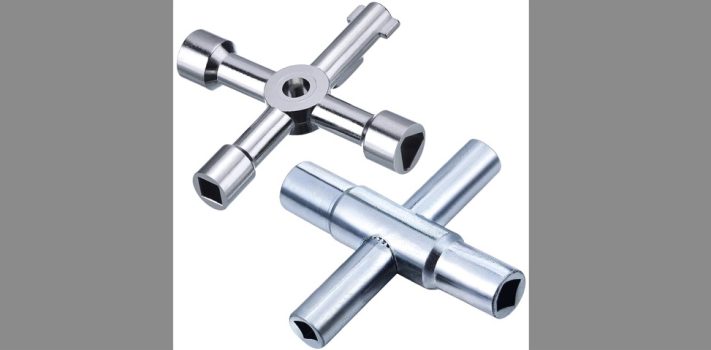One often overlooked item for a bugout bag is a Sillcock Key. This handy little wrench will allow you to access tap water from commercial establishments that have “limited access” water spigots. It is commonly called a Sillcock Key, Sillcock Wrench, or Sillcock Handle.
 You often see “security” spigot taps on the exterior walls of restaurants, stores, school buildings, shopping malls, and warehouses. There are several different styles. Some of them are “frost free”, and some are not. There are at least four different anti-tamper key patterns in common use in the United States, Mexico, and Canada. Hence the need for a versatile key pattern design. Note that this tool is most apropos for urban or suburban bugout situations, rather than for bugouts in rural areas. But I’ve even seen a few Sillcock anti-tamper fixtures used at some farms, ranches, and middle-of-nowhere parks and campgrounds.
You often see “security” spigot taps on the exterior walls of restaurants, stores, school buildings, shopping malls, and warehouses. There are several different styles. Some of them are “frost free”, and some are not. There are at least four different anti-tamper key patterns in common use in the United States, Mexico, and Canada. Hence the need for a versatile key pattern design. Note that this tool is most apropos for urban or suburban bugout situations, rather than for bugouts in rural areas. But I’ve even seen a few Sillcock anti-tamper fixtures used at some farms, ranches, and middle-of-nowhere parks and campgrounds.
Notes on Safe and Legal Use
Take heed that exterior faucets are often used infrequently, so be sure to flush the line for a few seconds before filling water containers.
Note: The legality of accessing tap water in this way is questionable, so only resort to the use of a Sillcock key in genuine emergencies.
The cruciform type of Sillcock key that I bought for myself and a couple of my family members will actually fit six different sizes of valve fittings since the transverse center hole has a hexagonal lug on one side and a square lug on the other side. These are available quite inexpensively on eBay, for about $8 each.
Ersatz Knucks
I should also mention that the cruciform pattern Sillcock key also has another use that I’ve never seen mentioned, even in survivalist literature: When grasped in your fist, one of these provides an ersatz brass knuckle effect. Position it with the smallest of the four key heads pointing outward, with two fingers on either side, for maximum effect. Surprise! and Ouch! It is best directed at pressure points such as the solar plexus.
Consider keeping the humble Sillcock Key in your vehicular bugout bag, as “cheap insurance.” – JWR










